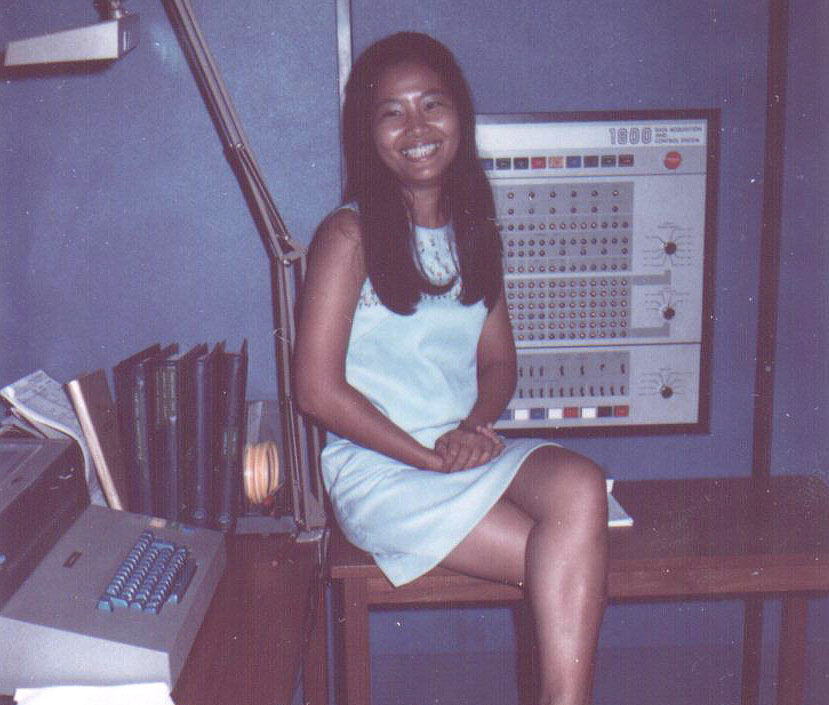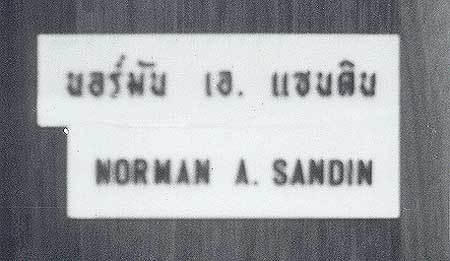THREE KINGS OF ORIENT
I couldn’t quite see over the trees bordering the circular drive to the auditorium, so I took the stairs up to the top floor of the Engineering Building at Chulalongkorn University (CU) in Bangkok, Thailand. The King was coming to participate in graduation ceremonies as was his custom, and I wanted to see his arrival. I tried not to be too blatant, keeping my body behind the elevator and just peeking out occasionally, but I didn’t escape the alert eyes of the police. As soon as I saw them approaching the building, I went back downstairs, told our receptionist Pim what had happened, went into my office and closed the door. Fortunately this was in the late ‘60s and not 100 years earlier when the King’s security forces would ride ahead of him and simply put an arrow in anyone whose head threatened to be higher than his.
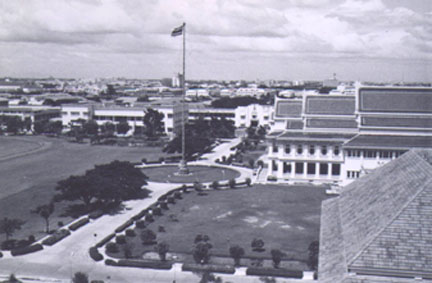
View from 6th floor of Engineering
Building
The police came into the building and up to our floor and talked to Pim. I’m not sure how she handled it but my guess is she allowed as how there were some simple minded “farang” (foreigners) in the building but she hadn’t seen any recently. I guess since I didn’t *actually* violate the rule but only *threatened to*, they chose to let it pass. Pim was worth her weight in gold!
***
Dave had spent several months perfecting software that transliterates text written in Thai characters into Latin (Roman) alphabet representation. He was understandably proud of his accomplishment.
A newsletter published by the CU Engineering Dept. made an announcement of the availability of the transliterator, describing it in some detail, but never mentioning Dave or our company. Dave was hurt and chose to display his feelings. He crafted a headband with “I wrote the transliterator” written on it and wore it on his forehead.
Our offices were in the Engineering Building and in fact the office of the department head was on the same floor. In typical fashion, no Thai ever said a word, but that afternoon Dave was informed that he was to be expelled from Thailand. Much discussion ensued and probably several crows were eaten with the result that Dave’s headband was destroyed and his expulsion was revoked.
***
The head of the Engineering Dept. spoke in Thai and began by introducing Dick to the member of the royal family who visited us (I think she was the Queen-Mother but just don’t quite remember) and then Dick conducted the tour of the computer facility we had set up. We had imported an IBM 1800 computer, with printer, card reader/punch, two tape drives, a Shinko teletype with Thai characters, and several other keyboard terminals. We also had a gigantic power modulator to cope with the irregular power from the local grid.
As Dick walked around pointing out all the equipment, he introduced Dave and me to the lady as well. The visit was cordial and it seemed to go without incident.
Engineering head Dr. (many letters) was of course a Ph. D. He treated us civilly, but always looked down his nose a bit because of our inferior education levels. Soon after the visit we learned through the grapevine that he had introduced Dick using the Thai equivalent of “mister”. Probably like you, when I first heard this, my reaction was “So?”. It took Pim and our Ph. D. linguist to explain the cultural importance of the event. This was the term a Thai would use to refer to a driver or someone of such station. Nothing ever came of it, but we learned that day exactly where we stood in the pecking order!
***
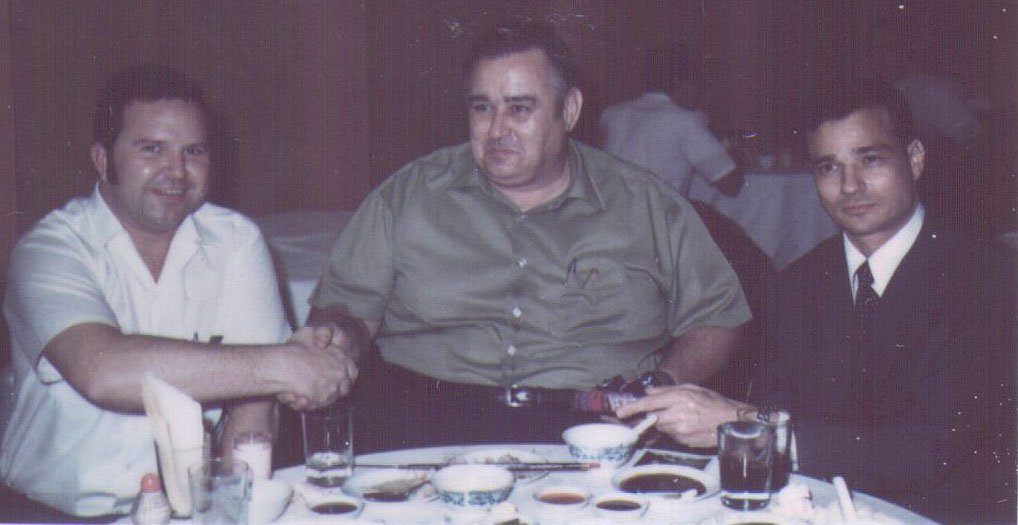
Pono – Dick – Dave – 1968
So what were we three Americans doing in Bangkok? Dick had been in Viet Nam on an assignment and got to know a person who worked for the US Advanced Research Projects Agency (ARPA). Dick came up with a proposal to introduce the country of Thailand (a nation friendly to the USA) to computer technology. He submitted the proposal to ARPA and it was awarded to the company for which we all worked. Naturally, Dick was designated principal on the contract. When his assignment in Viet Nam was complete, Dick returned to CA, interviewed people to work the project, and chose Dave and me.
Dave was a linguist and a programmer. I was a programmer who was nearing the end of an assignment on the program that created the first ever timesharing system (TSS). I actually worked on the Jovial compiler for that system, but necessarily became familiar with both the hardware and software of TSS.
Dick went immediately to Bangkok where he arranged for his personal accommodation and transportation needs, for project office space, the import of the computer and peripherals, the beginnings of a Thai staff, and all the many details of starting a project.
Dave was not far behind and with the help of a Thai Ph. D. linguist, he began implementation of the transliterator. Interestingly, almost as a side issue, they found it necessary to develop an order for Thai characters! We take our alphabet to be ordained and immutable, but when you think about it, the order is just a convenience and had to be specified at some time. Sure, we parallel the Greek alphabet, but someone defined the order of that “in the beginning”. Just think, if the Greeks decided on gamma, delta, alpha, beta, we would be singing the gammadelt song instead of the alphabet song!
I had trouble with that concept when I first heard about it, but later observed our No. 1 maid. Daeng spoke a bit of English, but we purchased a Thai-English dictionary to help out. When looking up a Thai word, she flipped randomly through the Thai section until she found the group containing the appropriate starting letter!
Arrangements were well underway before I got to Bangkok. First I had made a trip to another organization that owned a computer like the IBM 1800 going to Bangkok. They shared some software with me that really sounds basic now. I got a six-card bootstrap, a 26-pass Fortran compiler, and some odds and ends that supported a computer with a very small memory and nothing but card input! Since our machine had significantly more memory and sported two mag tapes, my first job in Bangkok was to upgrade the 26-pass card-based Fortran compiler to a much more efficient 6-pass tape-based version.
While Dick was getting the project going, he had worked on input/output software for the Shinko teletype to support Dave’s efforts and for the other keyboard devices to support my work. I proceeded to build the very first timesharing program to run in Thailand! To demonstrate it, a couple of us would go from terminal to terminal starting up programs that would use the printer, card reader, Shinko, and two tape drives – seemingly at the same time!
I know it doesn’t sound like much today, but it was mind-boggling at that time to see all that equipment running. Today, of course, your wrist watch has the equivalent of timesharing – if the time for the alarm you set happens to arrive when you are using your calculator or checking for the current time in Stockholm, the alarm goes off anyway – two separate applications running seemingly at the same time.
|
|
|
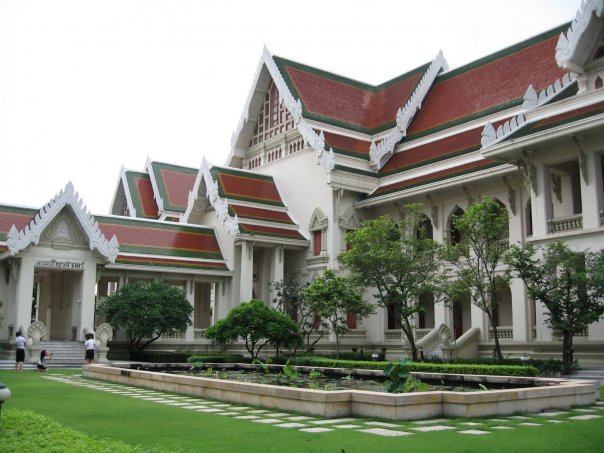
Side view of the CU Auditorium
So what was the redeeming social value of a transliterator and a timesharing system? The Thai character set was unique to Thailand and as such was a limiting factor to moving the country into computing and information sharing. Transliterating documents was a step toward sharing the content outside of Thailand. Timesharing provided for the economical use of computing resources. On our system, six or more people could sit at terminals and write Fortran programs, compile them, execute and debug them concurrently. Each person seemingly had the entire system at his or her command! This capability led to the next phase of our project.
Our goal was to obtain several young motivated Thais to learn computing by actually writing programs. The hope was that with actual experience, they would go out into industry and commerce and apply their knowledge to develop programming and computing in Thailand. We hired 8 or 10 people and Dave trained them in the use of 1800 assembly language.
After this phase, we moved our entire system from CU to a Thai military base. Dave and I gave classes in computing and programming to Thai officers. We held open houses and demonstrated the system to any and all who would take the time to attend, both military and civilian. We wrote a proposal to extend the activity and sent it back with an official to Washington.
You may remember that in September 1970, Palestinian guerrillas hijacked three airliners -- one TWA, one Swissair and one BOAC -- forcing them to land in Jordan where the planes were blown up. All hostages were released after 24 days in exchange for Palestinian prisoners. Our proposal was on one of those planes. We have never been certain, but we speculate that the incident may have caused us to miss a deadline or something, and that caused rejection of our extension.
So how did we do? We spent about $1m, introduced LOTS of Thai people to computers, trained some officers and civilians, and surely left an imprint. However….
Knowing our cultural limitations, we prevailed upon the Thai head of the Engineering Dept. to choose our employees. As we got to know them, we learned that one was his wife, one was a grad student in the Engineering Dept., one was the niece of the Prime Minister, etc. Watching them in action was interesting but not very rewarding. The young man who was assigned to help me was actually talented and knew how to program – he may have been the civilian to carry his knowledge forward.
Dave and I took Thai language lessons, but we never became fluent. Our classes to the military were depressing. The young officers knew about as much English as we knew Thai. When their eyes were open, they were still glazed, no one asked questions and culturally we couldn’t challenge, criticize, or even test them, and I doubt if we had any impact.
The open houses were always well attended and our computer operator, keypunch girl, and a couple of the programmers spent lots of time with the attendees, speaking Thai of course. We soon learned that the BIG attraction was NOT the unique timesharing system, but a fortune telling program that one of us had ginned up. You input a birth date and the program returned a short fortune. (Don’t ever reveal this, but the algorithm was a random selection of a very limited number of fortunes.) As the word spread, our operator said she took phone calls from all over, requesting fortunes.
All three of us had great times in Thailand and I think we all enjoyed our stays, but the cultural differences were as difficult to adapt to as the tonal nature of the language.
The King of Thailand was um… King and needed to be treated as such. In theaters, when a movie finishes all rise, the King’s picture appears on the screen, and the national anthem is played. Once while there, we read that a lady failed to rise at the end of a movie and was sentenced to a year in prison! It could have been as much as five years!
“Face” was very important – wearing a headband with words that could be construed as an insult was a grievous sin. On the other hand failing to recognize the author of a product was simply an oversight. And an elite Thai using “low class” words to refer to a “farang” was practically expected.
Dick probably made the biggest impact on Thailand personally. He acquired a girlfriend soon after arriving. Like so many other young ladies in Bangkok, she came from “upcountry” (outside of Bangkok). Dick actually went with her to her home village at least one time. They went on his huge motorcycle and got stuck in the mud off in the boonies, but upon final arrival he was greeted as some kind of a god due to his size and color. But then he donated $1000 for the village to build a small temple and the worship became complete! They are probably still talking about the huge, white farang god, on a gigantic motorized bicycle, with dollar bills sticking out of every pocket, and mud up to his knees!
Before Dick left, he bought his girlfriend a sewing machine and set her up in a small business. Although the $1m spent on this project probably didn’t get its money’s worth, Dick’s actions certainly had an impact on Thailand, both culturally and economically!
